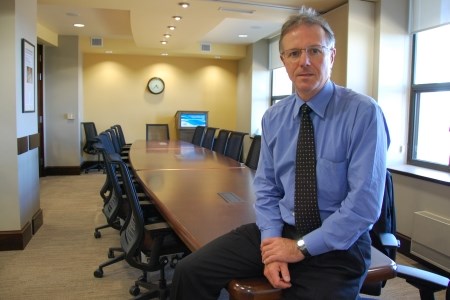Mining is big in Thunder Bay, and it only stands to get bigger.
Once heavily reliant on the forestry industry, the northwestern Ontario city has been making an economic transition into health sciences and knowledge-based industries.
But always lurking in the inner city industrial parks on streets named Alloy, Tungsten and Cobalt has been the mining sector.
Rebounding commodity prices coming out of the recession have put northwestern Ontario in the spotlight for the last few years.
Mining conferences are filling hotel rooms, and a record amount of exploration activity in the region and the Far North has created some junior mining superstars in Ewan Downie, Don Hoy and Mac Watson.
“It's captured the imagination of a lot of people throughout the province,” said Steve Demmings, CEO of Thunder Bay Community Economic Development Commission (CEDC), “particularly people in the North, as this has now come upon us very quickly.”
The CEDC has jumped on the bandwagon in branding the city as a mining supply and services hub by launching an online goods and services directory last spring.
Now they're out to snag a mining development officer who can help Thunder Bay take that next step to promote the city as a high-profile service centre.
Next spring, they hope to have someone heading up a dedicated mining services division with a budget and a mission to grow what they have and seize new opportunities.
“With this initiative, we want to go in full-steam,” said Demmings.
The marching orders for the corporate headhunters are to find a seasonal professional coming directly from the ranks of industry.
Garry Clark, executive director of the Ontario Prospectors Association based in Thunder Bay, said installing a mining point person is something that's long overdue.
“The town does not appreciate how much mining and exploration supports it. The economic impact of mining and exploration can't be underestimated. But in the last six years that's turned around.”
Clark estimates there are at least 18 junior mining companies located in the city employing anywhere between two and 30 people, including Australia's Magma Metals, next door to his Alloy Drive office.
“They have to mobilize the companies that are already here that don't understand the advantages and potential of mining,” said Clark. “And they have to try to attract companies to come to Thunder Bay that will show other companies the advantages of being here.”
He has noticed some industrial suppliers are finally catching on by stocking field supplies while some forestry consulting and silviculture firms are transferring their skill sets toward exploration clients.
Demmings knows politics plays a role in where the future chromite processing jobs will be located stemming from the Ring of Fire discoveries in the Far North, but he likes Thunder Bay's chances.
“We are well-positioned to realize all the economic development opportunities from the chromium but also the gold and iron ore exploration happening all around us. The Ring of Fire is one component of that.”
Demmings wouldn't get into specifics about how Thunder Bay can take advantage of these ripple efffects but said from the high-level meetings he's attended, the spinoffs will be massive and far-reaching.
”This opportunity can be as big as the Manhattan Project. When you start hearing the imagery around the opportunity, it's really transformational in terms of the region but also the impact on Ontario and Bay Street.”
Demmings said the job creation numbers from the construction and operational phases are going to create a Fort McMurray-like development flurry that will stretch the northwest's human resources and service sectors to the limit.
But he also paints a blue sky picture of what Thunder Bay could look like in 10 years with better streets, a healthier downtown, a more vibrant waterfront and a mining centre of excellence involving Lakehead University and Confederation College.
“In another decade you'll see another 15,000 people in this region with good-paying jobs in high technology, clean industries, and I see enormous opportunities for a total rebirth of our fabrication industries, which is already very busy.”
A loophole in the Ontario Mining Act allows companies to process Ring of Fire ore anywhere in Canada, but Demmings said it's vitally important to keep processing jobs here and cheap power is a great incentive to do that.
“I think affordable power is absolutely critical to the harvesting of these types of resources. We have to be very much engaged in these discussions because that's where the value is in the job creation.
“It comes from not just putting that raw product on a train and shipping it elsewhere, it has to be manufactured here.
“We intend to lobby, we intend to be heard and bend the arms of political decisionmakers. We intend to create compelling reasons for that business to be developed here. Whatever it takes.”




